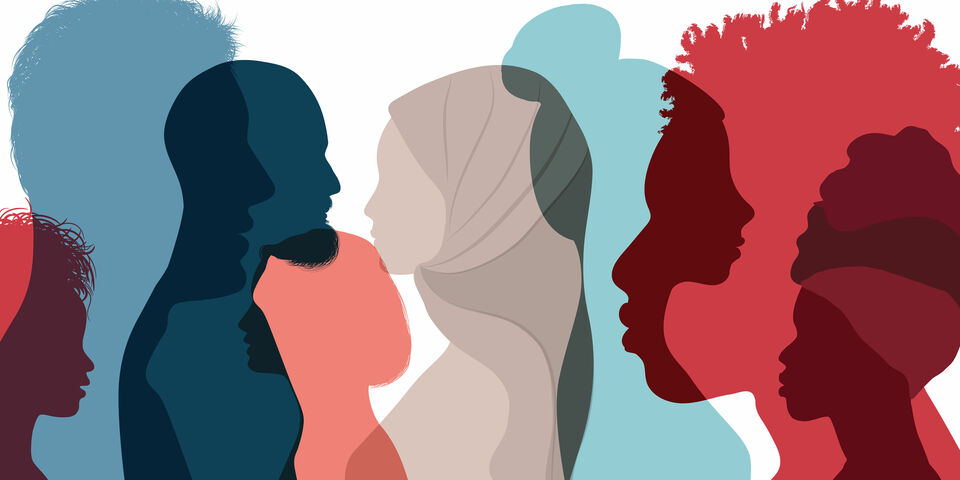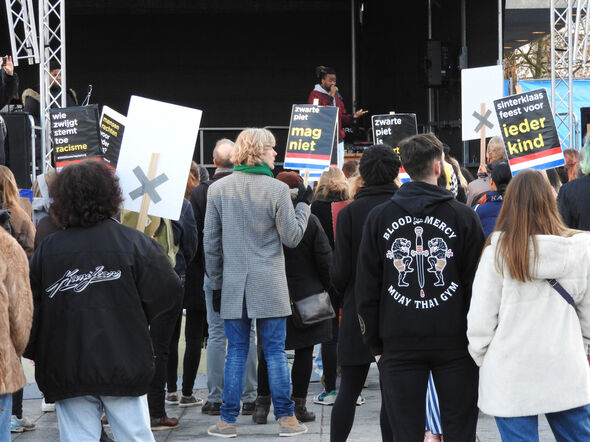Statement against racism needed
It is important that an institution makes a statement against racism. This is the view shared by both the participants and celebrated guest Jerry Afriyie in the online debate against racism held today. As part of Diversity Week, Lucas Asselbergs, director of Studium Generale, chaired the debate on whether racism occurs at TU/e and if so, how we should stop it. But as yet no statement has been forthcoming.
Racism at TU/e: yes, it exists. This comes as no surprise to Rector Frank Baaijens. “We are a reflection of our society, and racism is found there so it probably occurs at TU/e. If we look at official complaints, the situation is not worrying but, of course, that is only the tip of the iceberg. I am sure that it happens here too and we must do something about it.”
The participants have their own explanations for the infrequent reporting. Mention is made, for example, of its being a sensitive topic to talk about, that individuals are fearful of the consequences for their career, and that the accused will brush it off with ‘I didn't mean it like that’.
Making a statement
Online via MS Teams some forty people took their seats in the virtual environment for the interview, the majority employees. Also present were a panel of diversity advisors, university ombudspeople, Rector Frank Baaijens and Studium Generale director Lucas Asselbergs. And, of course, the guest, who was able to share examples of racism from his own personal experience and was keen to contribute solutions, Jerry Afriyie.
In the debate's chat stream, a statement by TU/e on Black Face is requested, which earns multiple likes. Any such statement or one on racism in general by the Executive Board never enters the discussion. “It is important how conversations on this topic are structured,” Afriyie knows. “Making a statement and taking responsibility are certainly important, especially when it is a large institution stepping up in this way. These acts help minority groups, who then think, ‘Wow, they are thinking of me, too. They are talking to me.’ Everyone must be part of the solution.”
What else needs to happen to work towards the solution? Chief Diversity Officer Evangelia Demerouti says that training is needed. “We must help people by giving them skills to deal with racism and cultural differences.” Afriyie speaks later about the importance of a long-term strategy and that it must go further than the occasional sharing of experiences.
From Ghana to the Netherlands
Afriyie has become known for his activism against Zwarte Piet (the Dutch St Nicholas character, ed.) and his role as frontman of the campaign group Kick Out Zwarte Piet. He also gives lectures and lessons on racism. Born in Ghana, he came to the Netherlands as a child after his parents divorced and his father was already living here.
“I was confronted at a young age with discrimination and racism, some of which involved being called 'Zwarte Piet'. I was not familiar with the name when I came here but soon became acquainted with the national celebration and talked to many people about it. They called it a tradition. But my experience of it was different. In 2008 I decided I wanted to truly contribute to this country. Until then my focus had remained on Ghana. I was living in the Bijlmer (neighborhood in Amsterdam, ed.) and started organizing activities for the children there. Many of them didn't feel at home here, and did not feel this was their country. I wanted to give them a voice. The language they spoke was Dutch, only Dutch, but other people had convinced them they did not belong here. I wanted to give them a sense of having a future here. In 2010 I gave a speech about Zwarte Piet and that it has to change. In 2011 the campaign ‘Zwarte Piet is Racism’ was born. The rest is history.”
Asselbergs acknowledges that it is tempting at this point to start discussing examples like Zwarte Piet, but that it is important to now focus on racism at TU/e. Via Menti.com the participants are polled on racism at the university and how it should be dealt with. More than half of those voting expect that racism does occur at TU/e. A small proportion has experienced it themselves or heard of incidents from people around them. By way of example, making racist jokes is mentioned.
Look at your own employees
Afriyie gives a passionate response to the question of whether people actively and consciously join groups that are diverse. This is because many people say they try to but often end up mixing with their own type of people. “We say ‘we don't see color and we are all one’. But colorblindness also makes us blind to injustice on that front. We have to accept that although there is a single race - the human race, we must also recognize that differences do exist. Here at the university, it is easy to say ‘we want more black students but they aren't coming’. Is it that they do not want to come or do they not come because it is not accessible enough? Representation matters, so also look at your employees. Your students might not be sufficiently diverse but you do have power as regards the employees you hire. We must take action because simply going home now and coming back to share another experience next year is not enough. How are we going to solve this and how are we ourselves part of the problem? White people cannot solve the problem themselves. There is no quick fix, a long-term strategy is needed.”
Asselbergs poses the question: “In 2030 will there be greater diversity at this university? Will policy promote that?” Baaijens responds, “There is no active student recruitment process based on diversity. We look at whether the applicant meets the entry requirements of the program. We are also seeing that minorities in Dutch society are also less represented at the university.” Afriyie responds to this by saying that the problem begins back in primary school. “I had to sit the Cito exam and instead of being advised to go on to the school that was appropriate for my score, another type of school was recommended, one that my teacher thought was good for me. Way back then, I was not encouraged to go to university. It is not the case that black people or other minorities here do not want to go to university.”
At the end of the debate, many people still have questions that cannot be asked due to the one-hour time limit. Lara Hofstra, Student Diversity Officer, promises that together with Demerouti she will look through all the questions and responses, and will announce a follow-up to the meeting, which several people are also requesting. To be continued...



Discussion